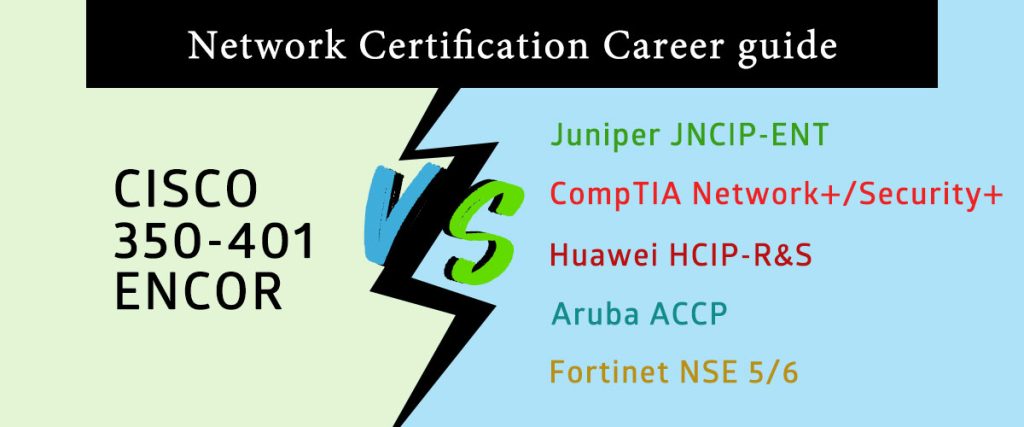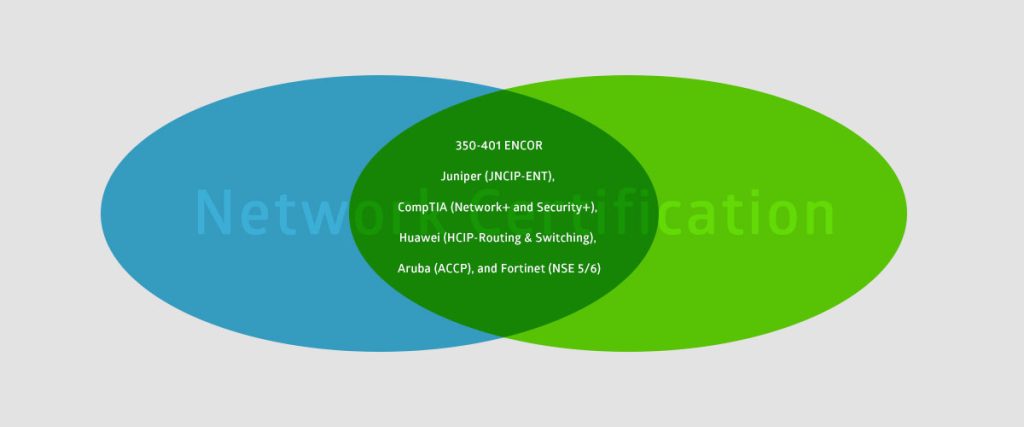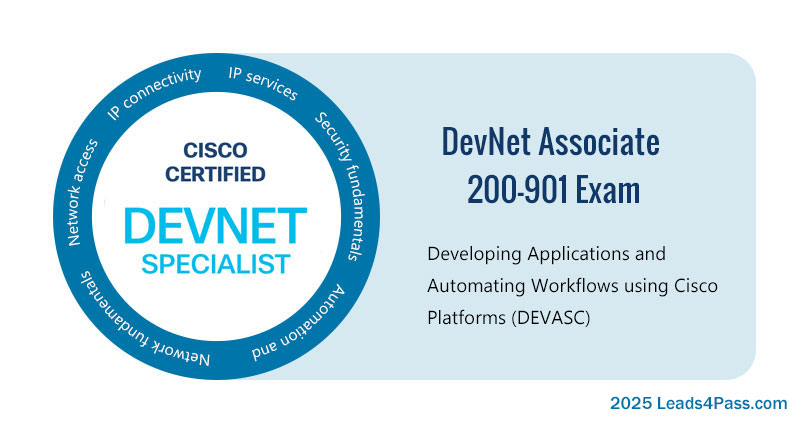
This is not a war!
It’s just a career choice.
It’s also a path of advancement.
The world of Network Certifications is vast — some people choose based on interest, some based on market demand, and others based on higher income potential.
No matter the reason, making a comprehensive comparison will make everything clear.
Now, I use the Cisco 350-401 ENCOR certification as a benchmark for comparison.
I will analyze and compare it with other competitive network certifications in the industry, focusing on key aspects such as objectives, content, difficulty, market recognition, career development paths, and costs.
Major competing certifications in the industry include Juniper (JNCIP-ENT), CompTIA (Network+ and Security+), Huawei (HCIP-Routing & Switching), Aruba (ACCP), and Fortinet (NSE 5/6).
Basic Information Overview
Know yourself and know your enemy, and you will never be defeated.
First, I will present a basic overview of each network certification.
I understand that some people may have taken one or two of them, but it’s unlikely that anyone has taken them all — so presenting this information is absolutely necessary.
Cisco 350-401 ENCOR
| Parameter | Details |
|---|---|
| Certification Name | Implementing Cisco Enterprise Network Core Technologies (ENCOR) 350-401 |
| Difficulty | Professional (Core exam for Cisco CCNP EHigh (Professional-level certification requiring intermediate to advanced networking experience). |
| Objective | Validates knowledge in enterprise network core technologies, including dual-stack (IPv4 and IPv6) architecture, virtualization, infrastructure, network assurance, security, and automation. |
| Exam Format | 120 minutes; includes multiple-choice questions, drag-and-drop, simulations, and labs. As of the 2024 update, lab questions appear in the first half of the exam. |
| Cost | $400 USD |
| Prerequisites | No formal requirements, but 3–5 years of networking experience and CCNA-level knowledge are recommended. |
| Career Path | Passing 350-401 plus one concentration exam earns the CCNP Enterprise certification. It also serves as the written qualification exam for CCIE Enterprise Infrastructure or Wireless. Ideal for roles like senior network engineer or network architect. Salary range: \$90,000–\$130,000. |
| Market Recognition | Cisco certifications are considered the gold standard in networking. With over 4 million certified professionals worldwide, 90% of employers say Cisco-certified staff improve job performance. |
Tips: In 2024, the exam format was updated to place approximately 5–8 lab items in the first 60 minutes, followed by 60 minutes of multiple-choice and drag‑and‑drop questions. There have been no changes in 2025.
VS Juniper JNCIP-ENT
| Parameter | Details |
|---|---|
| Certification Name | Enterprise Routing and Switching, Professional (JNCIP-ENT) – JN0-649 |
| Objective | Validates professional skills in Juniper enterprise routing and switching technologies (Junos OS), covering advanced routing, switching, troubleshooting, and automation. |
| Content | Topics include MPLS, EVPN, VXLAN, multicast, CoS (Class of Service), etc. More focused on service provider and data center environments. |
| Difficulty | Comparable to Cisco 350-401. However, due to Juniper’s smaller market share (around 10–15% vs. Cisco’s 50%), there are fewer study resources and community support. |
| Cost | Approximately \$400 USD, similar to Cisco. |
| Market Recognition | Recognized in specific regions (e.g., parts of Europe) or in enterprises using Juniper infrastructure. Overall, has less global influence than Cisco. |
| Career Path | Suitable for senior network engineers working in Juniper-based environments. Salary slightly lower than Cisco counterparts (around \$80,000–\$120,000 USD). |
Comparison Summary
- Advantages: Strong focus on Juniper ecosystem; smoother learning curve for those familiar with Junos.
- Disadvantages: Less versatile than Cisco; smaller global market share and fewer job opportunities.
VS CompTIA Network+ & Security+
| Parameter | Details |
|---|---|
| Objective | Network+: Entry-level certification validating basic networking knowledge including configuration, troubleshooting, and security fundamentals. Security+: Focuses on foundational cybersecurity topics such as threat detection, encryption, and access control. |
| Content | Network+: TCP/IP, subnetting, basic routing and switching, Wi-Fi setup. Security+: Firewalls, VPNs, IDS/IPS, risk management, and access control. |
| Difficulty | Much easier than Cisco 350-401; suitable for beginners. Exams are multiple-choice only, with no lab or simulation components. |
| Cost | Around \$350 USD per exam; approximately \$700 USD in total if taking both. |
| Market Recognition | Entry-level certifications; well-suited for junior network administrators or IT support roles. Significantly less recognized than CCNP for advanced positions. |
| Career Path | Ideal for junior network technicians or entry-level security analysts. Expected salary range: \$50,000–\$80,000 USD. |
Comparison Summary
- Advantages: Low entry barrier, abundant study resources, great for beginners or career changers.
- Disadvantages: Lacks depth and specialization; not comparable to the advanced enterprise networking skills in 350-401.
VS Huawei HCIP-Routing & Switching
| Parameter | Details |
|---|---|
| Objective | Validates intermediate to advanced skills in Huawei routing and switching devices, focusing on enterprise network design, configuration, and troubleshooting. |
| Content | Covers OSPF, BGP, MPLS, IPv6, basics of SDN, and Huawei-specific technologies such as iMaster NCE. |
| Difficulty | Comparable to Cisco 350-401. However, due to Huawei’s more closed ecosystem, candidates must be familiar with proprietary protocols and equipment. |
| Cost | Approximately \$300–\$500 USD (varies by region). |
| Market Recognition | High in the Asia-Pacific region (especially China) and some developing countries (e.g., Africa, Middle East). Limited recognition in North America and Europe due to Huawei’s market share (~15–20%). |
| Career Path | Suitable for telecom or enterprise environments where Huawei devices dominate. Expected salary range: \$80,000–\$110,000 USD. |
Comparison Summary
- Advantages: High demand in Huawei-dominated markets like China; slightly lower certification cost.
- Disadvantages: Less global versatility; learning resources are mostly in Chinese; weaker international support.
VS Aruba ACCP
| Parameter | Details |
|---|---|
| Certification Name | Aruba Certified ClearPass Professional (ACCP) |
| Objective | Validates professional skills in Aruba’s network access control (NAC) and wireless networking solutions, with a strong focus on the ClearPass product. |
| Content | Covers authentication, guest access management, BYOD configuration, wireless security, and policy enforcement. |
| Difficulty | Easier than Cisco 350-401, as it focuses specifically on wireless and NAC rather than full-scale enterprise networking. |
| Cost | Approximately \$300 USD. |
| Market Recognition | Recognized in the wireless networking domain, particularly in education, healthcare, and retail sectors. However, it has a smaller overall market share compared to Cisco. |
| Career Path | Ideal for wireless network engineers or NAC administrators. Expected salary range: \$85,000–\$115,000 USD. |
Comparison Summary
- Advantages: Focused on wireless and access control; Aruba (under HPE) is competitive in the wireless market.
- Disadvantages: Narrow scope; less versatility and career growth compared to 350-401.
VS Fortinet NSE 5/6 (Network Security Expert)
| Parameter | Details |
|---|---|
| Objective | Validates skills in Fortinet firewall and security solutions (e.g., FortiGate, FortiManager), covering network security and SD-WAN. |
| Content | Includes firewall policies, VPNs, threat management, SD-WAN configuration, and automation. |
| Difficulty | NSE 5: Easier than Cisco 350-401. NSE 6: Comparable in difficulty but focused more on security rather than full-spectrum networking. |
| Cost | NSE 5: Approximately \$200–\$300 USD. NSE 6: Approximately \$400 USD. |
| Market Recognition | Well-recognized in the network security domain, especially among SMBs. Fortinet ranks highly in the UTM (Unified Threat Management) market. |
| Career Path | Suitable for network security engineers or Fortinet device administrators. Expected salary range: \$90,000–\$120,000 USD. |
Comparison Summary
- Advantages: Security-focused, lower certification cost, good for professionals in the cybersecurity field.
- Disadvantages: Less coverage of general networking; versatility limited to Fortinet ecosystem.
Why should I compare them together?
Because they have many similarities, and some of these certifications are very familiar to me, while others are very familiar to my colleagues.
So, what do they have in common?
Commonalities

Although these certifications target different vendors or technology areas, they have significant commonalities in the following areas:
In the Field of Networking and Security:
- All certifications fall within the IT networking or cybersecurity domain, aimed at validating candidates’ abilities in designing, configuring, maintaining, or securing network infrastructure.
- Core topics include routing, switching, network security, automation, and troubleshooting, though with different focuses (e.g., Fortinet emphasizes security, Aruba focuses on wireless).
Industry-Recognized Standards:
- These certifications are offered by leading vendors or organizations (Cisco, Juniper, Huawei, CompTIA, HPE Aruba, Fortinet) and carry authority globally or in specific markets.
- They are used by enterprises to assess the skills of network engineers or security professionals, particularly during hiring or promotions.
Blend of Theory and Practice:
- Each certification requires mastery of theoretical knowledge (e.g., protocol principles, architecture design) and practical skills (e.g., device configuration, troubleshooting).
- Exams typically include multiple-choice questions, drag-and-drop tasks, and simulation/lab questions (except CompTIA, which leans more theoretical).
Career Development Focus:
- These certifications pave the way for specific roles, such as network engineer (Cisco, Juniper, Huawei), wireless specialist (Aruba), security engineer (Fortinet), or entry-level technician (CompTIA).
- They enhance salary potential (ranging from $50,000 for CompTIA to $130,000 for Cisco).
Continuous Learning Requirements:
- Most certifications have an expiration period (typically 3 years) and require continuing education or recertification to remain valid (e.g., Cisco, Juniper, Huawei, Aruba, Fortinet).
- CompTIA also offers Continuing Education Units (CEUs) for renewal.
Reliance on TCP/IP Fundamentals:
- All certifications require an understanding of the TCP/IP protocol stack, subnetting, the OSI model, and core networking concepts (e.g., VLANs, NAT, ACLs).
- These form the universal language of the networking industry, permeating all learning content.
They have similarities, but also many differences, which we have comprehensively compared in the table above.
Whether your choice is driven by passion, income, or market trends — choice matters more than effort.
Selection Recommendations
If you seek broad career opportunities and global recognition: Cisco 350-401 ENCOR is the best choice due to its comprehensive coverage of enterprise networking technologies and Cisco’s dominant market share (approximately 50%). It suits professionals aiming for senior network engineer roles or progressing toward CCIE.
If you work in a specific vendor environment:
Juniper JNCIP-ENT is ideal for enterprises or service providers where Juniper equipment predominates.
Huawei HCIP is suitable for Asia-Pacific markets or regions with widespread Huawei device usage.
Aruba ACCP is tailored for scenarios focused on wireless networking.
Fortinet NSE is appropriate for cybersecurity roles or users of Fortinet equipment.
If you’re a networking beginner: CompTIA Network+ offers a lower entry barrier but requires further specialization (e.g., CCNA or 350-401) for advanced roles.
Consider cost vs return: Cisco 350-401 has moderate costs ($400) but demands significant study time. In contrast, CompTIA and Fortinet NSE 5 have lower costs but also offer lower returns (salary and job prospects).
Use High-Quality 350-401 ENCOR material
Do not rely on any study resources to prepare for the 350-401 ENCOR.
We recommend using practice exams that have been utilized by candidates who have already passed the exam.
Join the Leads4Pass Acceleration Program, where you’ll have the opportunity to identify your weaknesses and gaps for quick improvement. The comprehensive practice questions include 1,307 single-choice and multiple-choice questions, 115 drag-and-drop questions, and, most importantly, 35 simulation labs.
Conclusion
The Cisco 350-401 ENCOR certification offers unmatched versatility and recognition in the industry, making it ideal for professionals pursuing advanced networking careers. While certifications from Juniper, Huawei, Aruba, and Fortinet are competitive in specific domains or regions, their market reach and career growth potential generally fall short of Cisco’s.
If your goal is to become an enterprise networking expert or progress toward CCIE, the 350-401 is one of the most worthwhile certifications to invest in.
Achieving the Cisco 350-401 ENCOR certification depends on your prior knowledge, study habits, and the resources you choose to use.
If you have specific career goals (e.g., focusing on security or wireless) or work in a region with specific vendor preferences, please provide more details, and I can tailor more detailed recommendations for you!
Discover more from Provide the most popular Cisco (CCNA, CCNP, CCIE, CCDP...) IT certification exam questions and answers, exam dumps, Leads4pass expert team will help you easily obtain Cisco, Microsoft, CompTIA, Citrix, Amazon IT certification
Subscribe to get the latest posts sent to your email.




Recent Comments